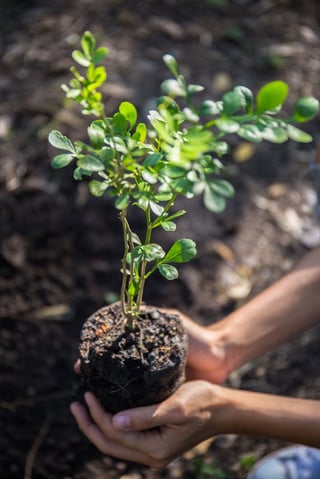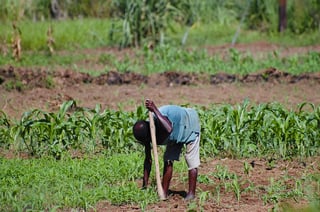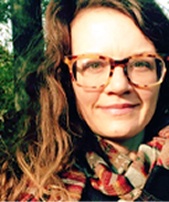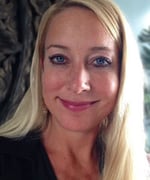Peace Corps Meets Pacifica: Cultivating, Counseling, and Stories from Cameroon An Interview with Paul D. Coverdell Fellow and Returned Peace Corps Volunteer, Courtney McCubbin
A guest post by Bonnie Bright, Ph.D.
 Nothing can substitute for experience as a way of knowing. It serves as a powerful initiation process that begins the moment you put your foot on a particular path. This appears to be the case for Courtney McCubbin, who served in the Peace Corps in Cameroon in Africa from 2001 to 2005. While McCubbin struggled mightily to learn French in order to communicate with the people there, a task that frequently brought her to tears, she took comfort her deep desire to help people, and threw herself into projects in reforestation, agroforestry, and agronomy, which contributed to the healing of the forests and the farmers there who needed help.
Nothing can substitute for experience as a way of knowing. It serves as a powerful initiation process that begins the moment you put your foot on a particular path. This appears to be the case for Courtney McCubbin, who served in the Peace Corps in Cameroon in Africa from 2001 to 2005. While McCubbin struggled mightily to learn French in order to communicate with the people there, a task that frequently brought her to tears, she took comfort her deep desire to help people, and threw herself into projects in reforestation, agroforestry, and agronomy, which contributed to the healing of the forests and the farmers there who needed help.
 To do agroforestry, McCubbin realized, she needed trees. The first thing she did was start a tree nursery, which then required her to build a fence around it to protect it from rodents. Once she began getting interest from farmers, she gave them seedlings to work with. She also created a demonstration farm to show native farmers techniques they could use, and also pitched in on farmers’ lands to show them useful tips and techniques for using tree species to improve soil fertility and erosion control. She also offered multiple other tools, including bee farming, animal husbandry, and contour farming, among them.
To do agroforestry, McCubbin realized, she needed trees. The first thing she did was start a tree nursery, which then required her to build a fence around it to protect it from rodents. Once she began getting interest from farmers, she gave them seedlings to work with. She also created a demonstration farm to show native farmers techniques they could use, and also pitched in on farmers’ lands to show them useful tips and techniques for using tree species to improve soil fertility and erosion control. She also offered multiple other tools, including bee farming, animal husbandry, and contour farming, among them.
While McCubbin feels she did good work as a volunteer in the Peace Corps, and connected in profound ways to the community during her time abroad, she began to realize that her interpersonal relationships weren't thriving as much as she would wish. As much as she had been outwardly focused on helping others, she wanted to focus on helping and healing herself, a process which resulted in another very different experiential initiatory phase in her life.
Acknowledging a strong interest in emotional literacy, trauma legacies within families, and the development of the intimacy with self, others, and the divine, McCubbin relates how she began working one-on-one and doing group work with a psychodynamic psychotherapist. It was a big first step for her to go to a psychotherapist as it wasn’t encouraged in her family of origin, she admits, but she learned so much as a patient. She laughs now to think she announced to her psychotherapist that she had nine months to “fix her,” when she ultimately ended up staying for eight years of therapy.
 Part of the psychotherapy McCubbin experienced included five years of group therapy in the style of Louis Ormont[1] , led by McCubbin’s therapist, Ginger Sullivan[2] . Ormont’s group work is based on the use of immediacy and McCubbin was part of a small group of five to nine people who met on a regular basis. Group participants don't talk about their lives in the outside world, McCubbin reports, and they don't know anything about other group members except for their first name. All they do is interact with each other in the moment, in the room. The fundamental idea behind this style of group therapy is that as individuals, we continually recreate our primary relationships, whether with our family of origin or romantic relationships, so working in a group in this manner provides a mirror or an opportunity to look at how we interact in the world, and how people really receive us, positively or negatively. It also then enables us to change ourselves in community with others, McCubbin observes.
Part of the psychotherapy McCubbin experienced included five years of group therapy in the style of Louis Ormont[1] , led by McCubbin’s therapist, Ginger Sullivan[2] . Ormont’s group work is based on the use of immediacy and McCubbin was part of a small group of five to nine people who met on a regular basis. Group participants don't talk about their lives in the outside world, McCubbin reports, and they don't know anything about other group members except for their first name. All they do is interact with each other in the moment, in the room. The fundamental idea behind this style of group therapy is that as individuals, we continually recreate our primary relationships, whether with our family of origin or romantic relationships, so working in a group in this manner provides a mirror or an opportunity to look at how we interact in the world, and how people really receive us, positively or negatively. It also then enables us to change ourselves in community with others, McCubbin observes.
McCubbin is a firm believer in the power of emotional literacy. To be able to understand how are you feeling in any given moment, what kind of actions that leads you to take, and what you need from others when you have those feelings—then to be able to communicate about those kinds of things is classic counseling work, and so rewarding, she learned.
This also contributes toward the healing of others, she believes, extending even to generations of the past and generations of the future. When she started doing her own therapy, McCubbin recalls, her relationships in her family of origin began to change. Because she established healthy boundaries, other relationships in the whole family system transformed. The process of grieving and understanding that family members often act out based on their own legacy of trauma gave her more compassion for everyone, and truly changed her life. “Psychotherapy gave me my childhood back,” McCubbin maintains.
Toward the end of those eight years, McCubbin began having vivid dreams and unusual somatic experiences, including inexplicable chronic pain in her shoulders. At the same time she was healing at a psychological level, she observes, she also felt that new material was presenting itself—including and especially through images. As images became more prevalent for her, she naturally “fell backward into” active imagination, even without knowing about Carl Jung’s work on the subject or having a formal context for what she was doing. It was time for a new phase in her process to manifest itself.
While on an extended trip to see New Mexico for the first time, she stayed with someone who had a degree in Depth Psychology from Pacifica Graduate Institute and decided to look into it. Now finishing her first year in the M.A. Counseling Psychology Program at Pacifica, Courtney can see how the idea of an archetypal “wounded healer,” a concept which arises frequently in course discussions, provides an image for a journey of healing. Each of us is both a doctor and a sick patient, depending on the day, she notes.
Now that she’s training to be a therapist herself, McCubbin is acutely aware of lessons she learned when she was “on the other side” of therapy as a client. Her experience in the therapy room will profoundly influence who she is as a therapist, she realizes now.
Listening to McCubbin relate her story, I’m profoundly struck by the images and metaphors that seem to tie the different phases of her life together. While focusing on agroforestry, she built a farm with a protective fence so she could grow new seedlings for farmers. While in therapy, she worked on creating boundaries and nurturing her psyche. As a therapist or counselor, she is developing the capacity to provide fertile ground so that something new can grow within the psyche of the clients she sees.
Through my own depth psychological lens, I’ve been keenly aware of the profound erosion of soul in contemporary western culture, which desperately needs to be reforested in a new and different way. Through McCubbin’s willingness to pursue a career in counseling, can now begin to parlay that kind of literal experience into something new, different, and profound in her work with soul.
McCubbin is excited about those prospects for the future. While she’ll be graduating from the Counseling Psychology Program at Pacifica in May of 2019, she’s looking forward to applying a depth perspective during her upcoming externship with The Women's Center in Vienna[3], Virginia, where she’ll be doing practicum hours and seeing clients under supervision.
She is particularly appreciative of how unique Pacifica is in offering a depth education so she can bring it to her work with clients. She loves active imagination and working with images because it is really efficient. “You can drop down into a really deep place and do work very quickly, and then you can use that same work to kind of put you back together again and send you out into the world in the way that feels more integrative than my regular therapy felt to me at some times,” she asserts. She also really enjoys Jungian psychology and dream work. She is working with a Jungian analyst now, and can picture herself possibly pursuing that in the future. Too, she continues to be passionate about group work. At a time when it’s easy to feel like our collective sense of community has been decimated, she suggests, if everyone were in group therapy, we could rebuild community all around.
 I can’t help but think that extends beyond just community with people, but also to community with our fellow beings in the world, the four-leggeds, and the winged ones, the plants, and even community or a sense of relationship with the place that we're in. McCubbin agrees. Her time in Cameroon was perhaps the beginning of her profound interest in nature, she relates. There was like a rain forest behind her house with the most beautiful butterflies in it, and Cameroon features a culture where people still have totem animals, and recite legends about people's animal selves. There is a lot of mythology and folklore that's has largely disappeared from western culture today, so people in Cameroon feel more connected to the land around them. Farming also connects you deeply to the land, she reminds me. Having your hands in the dirt and experiencing the joy that comes from “going out into your garden to pick your supper” allows for deep relationship. She notices she doesn’t feel as connected to the land since coming back from the Peace Corps, and it is something she greatly misses.
I can’t help but think that extends beyond just community with people, but also to community with our fellow beings in the world, the four-leggeds, and the winged ones, the plants, and even community or a sense of relationship with the place that we're in. McCubbin agrees. Her time in Cameroon was perhaps the beginning of her profound interest in nature, she relates. There was like a rain forest behind her house with the most beautiful butterflies in it, and Cameroon features a culture where people still have totem animals, and recite legends about people's animal selves. There is a lot of mythology and folklore that's has largely disappeared from western culture today, so people in Cameroon feel more connected to the land around them. Farming also connects you deeply to the land, she reminds me. Having your hands in the dirt and experiencing the joy that comes from “going out into your garden to pick your supper” allows for deep relationship. She notices she doesn’t feel as connected to the land since coming back from the Peace Corps, and it is something she greatly misses.
McCubbin’s journey from working and serving native farmers in the rain forests of Cameroon, to experiencing the healing power of doing her own psychotherapy, to training to sit on the other side of the room in the therapist’s chair so she can help others experience their own profound growth seems truly magical. She is nurturing soul in ways that can only bear many fruits to come.
Listen to the full audio interview with Courtney McCubbin here (approx. 31 mins)
Learn more about the M.A. Counseling Psychology Program at Pacifica
Read about the Peace Corps at https://www.peacecorps.gov
Learn about the Paul D. Coverdell Fellowship at https://www.peacecorps.gov/volunteer/university-programs/coverdell-fellows/
[1] Read about the work of Louis Ormont at http://www.groupcenter.org/
[2]Visit the web site for psychodynamic psychotherapist, Ginger Sullivan, at https://gingersullivan.org/
[3]Learn more about The Women’s Center at http://thewomenscenter.org/
 Courtney McCubbin is a Coverdell Fellow at Pacifica Graduate Institute. She is studying for a Master’s in Counseling in a depth psychological program and expects to graduate in May of 2019. Courtney is a Returned Peace Corps Volunteer from Cameroon where she served from 2001 – 2005 doing agroforestry and reforestation projects. Courtney has done extensive personal therapy with Ginger Sullivan in Washington D.C. including five years of group therapy in the style of Louis Ormont from the Center for Group studies in NYC. Courtney has studied dream work with Toko-Pa Turner and projective dream worker Jeremy Taylor. She is most interested in active imagination work as well as the use of immediacy in therapeutic relationships as agents for healing. Courtney is interested in topics such as emotional literacy, trauma legacies within families, and development of intimacy with the self, others, and the divine. Beginning May 1, Courtney will be doing a yearlong externship with The Women’s Center in Vienna, VA. Courtney is over the moon with the synchronicity that Pacifica, The Women’s Center and she are all celebrating 40 year anniversaries!
Courtney McCubbin is a Coverdell Fellow at Pacifica Graduate Institute. She is studying for a Master’s in Counseling in a depth psychological program and expects to graduate in May of 2019. Courtney is a Returned Peace Corps Volunteer from Cameroon where she served from 2001 – 2005 doing agroforestry and reforestation projects. Courtney has done extensive personal therapy with Ginger Sullivan in Washington D.C. including five years of group therapy in the style of Louis Ormont from the Center for Group studies in NYC. Courtney has studied dream work with Toko-Pa Turner and projective dream worker Jeremy Taylor. She is most interested in active imagination work as well as the use of immediacy in therapeutic relationships as agents for healing. Courtney is interested in topics such as emotional literacy, trauma legacies within families, and development of intimacy with the self, others, and the divine. Beginning May 1, Courtney will be doing a yearlong externship with The Women’s Center in Vienna, VA. Courtney is over the moon with the synchronicity that Pacifica, The Women’s Center and she are all celebrating 40 year anniversaries!
 Bonnie Bright, Ph.D., is a graduate of Pacifica’s Depth Psychology program, and the founder of Depth Psychology Alliance, a free online community for everyone interested in depth psychologies. She also founded DepthList.com, a free-to-search database of Jungian and depth psychology-oriented practitioners, and she is the creator and executive editor of Depth Insights, a semi-annual scholarly journal. Bonnie regularly produces audio and video interviews on depth psychological topics. She has completed 2-year certifications in Archetypal Pattern Analysis via the Assisi Institute and in Technologies of the Sacred with West African elder Malidoma Somé, and she has trained extensively in Holotropic Breathwork™ and the Enneagram.
Bonnie Bright, Ph.D., is a graduate of Pacifica’s Depth Psychology program, and the founder of Depth Psychology Alliance, a free online community for everyone interested in depth psychologies. She also founded DepthList.com, a free-to-search database of Jungian and depth psychology-oriented practitioners, and she is the creator and executive editor of Depth Insights, a semi-annual scholarly journal. Bonnie regularly produces audio and video interviews on depth psychological topics. She has completed 2-year certifications in Archetypal Pattern Analysis via the Assisi Institute and in Technologies of the Sacred with West African elder Malidoma Somé, and she has trained extensively in Holotropic Breathwork™ and the Enneagram.



